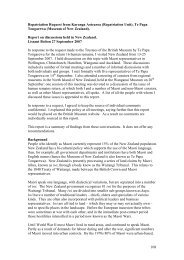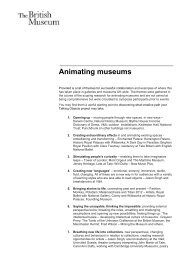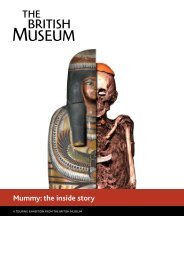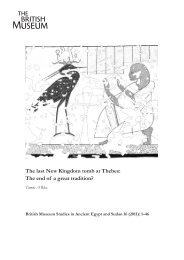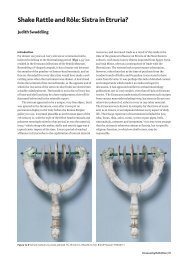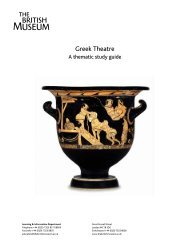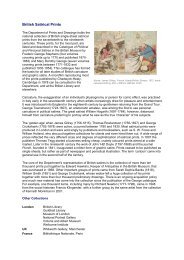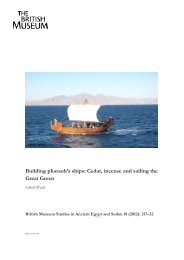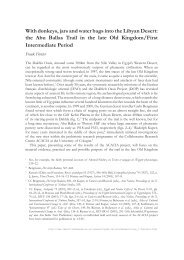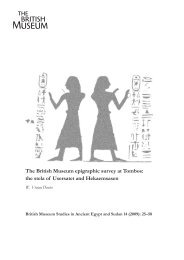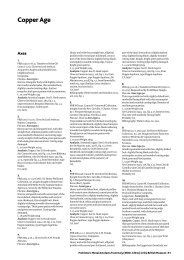The wealth of Africa The Slave Trade - British Museum
The wealth of Africa The Slave Trade - British Museum
The wealth of Africa The Slave Trade - British Museum
You also want an ePaper? Increase the reach of your titles
YUMPU automatically turns print PDFs into web optimized ePapers that Google loves.
Resistance and abolition<br />
<strong>The</strong> <strong>wealth</strong> <strong>of</strong> <strong>Africa</strong><br />
<strong>The</strong> <strong>Slave</strong> <strong>Trade</strong><br />
From the beginning <strong>of</strong> the trade enslavement in all forms was resisted. This resistance by<br />
<strong>Africa</strong>ns to the Transatlantic <strong>Trade</strong> took many forms. Captives took part in mutinies on board<br />
slave ships, rebellions on the plantations, and many more were involved in everyday acts <strong>of</strong><br />
defiance or refusal to comply with orders on the plantations. Some made the decision to<br />
commit suicide. <strong>The</strong>re are several accounts <strong>of</strong> slave ships being attacked by <strong>Africa</strong>ns while<br />
they were loading their cargo, and the captives being freed. Nearly 400 cases are recorded <strong>of</strong><br />
revolts aboard the ships engaged in the Transatlantic trade. In Jamaica, communities <strong>of</strong> escaped<br />
enslaved <strong>Africa</strong>ns formed, and became known as Maroons. One <strong>of</strong> the leaders, Nanny <strong>of</strong> the<br />
Maroons, led the fight against the <strong>British</strong> from 1720 to 1729. In 1831 the Baptist preacher<br />
Samuel Sharpe encouraged fellow enslaved <strong>Africa</strong>ns to stop working after Christmas Day until<br />
they received better conditions. This led to a full scale rebellion, and Sharpe was hanged for his<br />
part in the plot. One <strong>of</strong> the greatest rebellions took place on what is now Haiti, where in 1791<br />
Toussaint L’Ouverture and his fellow <strong>Africa</strong>ns fought against their French masters for 13 years<br />
until they managed to establish the second independent country in the New World after the<br />
United States. As well as overt acts <strong>of</strong> resistance enslaved people also resisted their owners<br />
demands by continually working at a slower pace and by practicing forms <strong>of</strong> music, dance and<br />
religion based on their cultural heritage.<br />
At around the same time, there was increasing awareness in Europe <strong>of</strong> the horrors <strong>of</strong> the<br />
Transatlantic trade. By the second half <strong>of</strong> the 18th century people in Britain had begun<br />
to question the morality <strong>of</strong> the enslavement <strong>of</strong> <strong>Africa</strong>ns, and religious groups including the<br />
Quakers and Methodists led campaigns against the trade. Petitions were organised, letters<br />
were sent to parliament, and mass sugar boycotts were organised. Figures such as the politician<br />
William Wilberforce, the campaigner Thomas Clarkson, the writer Hannah More and the former<br />
enslaved <strong>Africa</strong>n Olaudah Equiano spread the abolitionists’ message. Eventually, in 1807, the<br />
Abolition <strong>of</strong> the <strong>Slave</strong> <strong>Trade</strong> Act was passed, banning the trade in the <strong>British</strong> Empire, but it<br />
took another 27 years before enslavement was banned. <strong>The</strong> story told <strong>of</strong> the ending <strong>of</strong> the<br />
Transatlantic <strong>Slave</strong> <strong>Trade</strong> has in the past been dominated by the histories <strong>of</strong> these abolition<br />
campaigns, but the resistance and rebellions against enslavement by <strong>Africa</strong>ns had a huge<br />
impact, and both should be discussed together. <strong>The</strong>re are more detailed resources on resistance,<br />
rebellion and abolition available online at www.recoveredhistories.org/storiesresist.php<br />
<strong>The</strong> impact <strong>of</strong> the Transatlantic <strong>Slave</strong> <strong>Trade</strong> on <strong>Africa</strong><br />
<strong>The</strong> Transatlantic <strong>Slave</strong> <strong>Trade</strong> had a huge impact on Europe and the Americas, bringing great<br />
<strong>wealth</strong> to the traders and their countries. It had an enormous impact on <strong>Africa</strong>, and the available<br />
population figures show that there was a slowdown in the rate <strong>of</strong> population growth in <strong>Africa</strong>, and<br />
<strong>Africa</strong>’s share <strong>of</strong> world population declined during the period <strong>of</strong> the Transatlantic <strong>Slave</strong> <strong>Trade</strong>. It is,<br />
however, even more difficult to get accurate figures for the population <strong>of</strong> different parts <strong>of</strong> <strong>Africa</strong><br />
in this period than it is to get accurate figures for the numbers <strong>of</strong> <strong>Africa</strong>ns who were enslaved.<br />
It is clear that some <strong>Africa</strong>ns were made <strong>wealth</strong>y by the trade, for example the kingdom <strong>of</strong> Bambara<br />
in West <strong>Africa</strong>, formed in around 1712, derived much <strong>of</strong> its <strong>wealth</strong> in the later 18th century from<br />
raiding and trading in captives. Sometimes this demand for captives could cause problems, as for<br />
example when the kingdom <strong>of</strong> Benin began expanding its territory to gather more captives, which<br />
later led to its decline due to resistance by its own people and economic problems caused by the<br />
unequal balance <strong>of</strong> <strong>wealth</strong>.<br />
4




